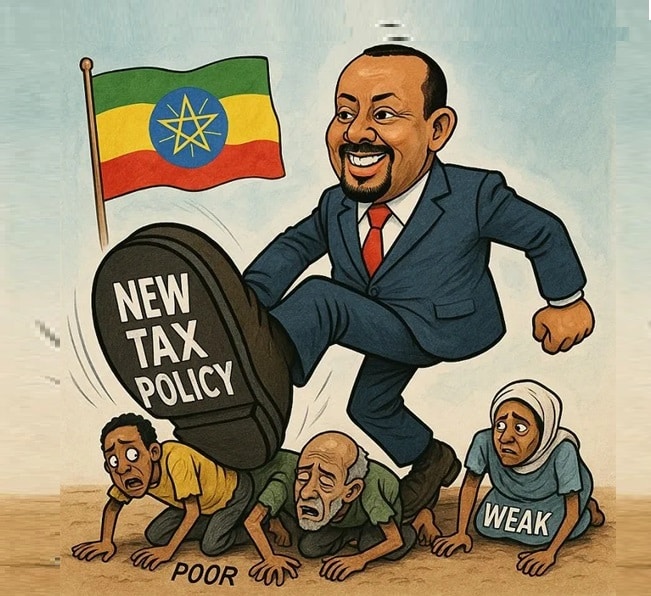By: Abyot Alemu
August 9, 2025
 In recent years, Ethiopia’s tax system has shifted from being a tool for national development to a burden that is crushing the very people it is supposed to empower. What was once a mechanism to fairly distribute the cost of running our nation has now become a desperate scramble for revenue—one that is leaving taxpayers in despair and the economy gasping for air.
In recent years, Ethiopia’s tax system has shifted from being a tool for national development to a burden that is crushing the very people it is supposed to empower. What was once a mechanism to fairly distribute the cost of running our nation has now become a desperate scramble for revenue—one that is leaving taxpayers in despair and the economy gasping for air.
A telling example is the story of a woman I know personally. She recently closed her small business just before the Ethiopian fiscal year ended. Her operations had been modest, with minimal income in her final months. But when she approached the tax office to process her closure, she was slapped with an annual tax bill far exceeding her actual earnings. She appealed, but instead of fairness, she met with an unspoken but well-known practice—tax officers hinting that the amount could be “adjusted” if she was willing to offer them a bribe. Faced with impossible payments and a system dripping with corruption, she walked away from her business in debt, humiliated, and hopeless.
Her case is not unique. Across Ethiopia, from small traders to large enterprises, business owners are being handed inflated tax assessments that have no grounding in their real financial situations. Many are selling their assets just to meet these demands. The supposed logic behind the system—estimating taxes based on “average” market activity—has devolved into subjective guesswork. The result? Arbitrary figures that feel more like punishment than policy.
Part of the problem lies in the external pressure on Ethiopia’s fiscal policy. The International Monetary Fund (IMF) has been pushing for aggressive tax collection targets as a condition for financial support. While improving tax revenue is important, the way it is being enforced here—without modern auditing tools, without fair assessment systems, and without safeguards against abuse—has turned taxation into an instrument of economic strangulation.
Instead of stimulating growth, the current system is scaring off investors, forcing honest businesses into bankruptcy, and incentivizing tax evasion. And when taxpayers do appeal, many report a toxic culture of corruption in which “reductions” are granted only in exchange for bribes—undermining trust in government and deepening inequality.
If left unchecked, this will not only destroy livelihoods but also erode the very social contract between state and citizen. Ethiopia desperately needs a tax policy overhaul—one that is transparent, data-driven, and anchored in justice rather than desperation. We can look to nations with fairer systems, where taxes are proportionate to income, enforcement is free from corruption, and compliance is rewarded rather than punished.
Tax is not meant to be a death sentence for businesses—it should be a fair contribution to building our shared future. Until Ethiopia takes that truth seriously, our economy will continue to bleed talent, investment, and hope.

It is IMF sucking Ethiopian blood through various straws called “new taxes”.